The career of Simon Russell Beale (b. 1961) needs little introduction. It took wing with the Royal Shakespeare Company but, give or take the odd foray into other buildings, including work with Sam Mendes at the Donmar Warehouse and more recently with the Bridge Project, he has made the National Theatre his home. Of all the Hamlets seen in the past 20 years, his seems to be the one that more than any remains unforgettable in the collective memory. Meanwhile, anyone who saw him as a camp King Arthur in Spamalot may not have guessed that long before Russell Beale took acting seriously, he took singing seriously. Hence Sacred Music.
The first series of Sacred Music was shown on BBC Four in 2008. Its quartet of films focused on French plainsong and polyphony, moved to Rome to investigate the heated atmosphere of intrigue against which Palestrina composed, then returned to England to celebrate the work of Tallis and Byrd. It finished with Bach. Leaving his box of thespian tricks unopened, Russell Beale proved an enlightened, engaging guide, while alongside him the conductor Harry Christophers and his choir The Sixteen (pictured below) explored the music in performance.
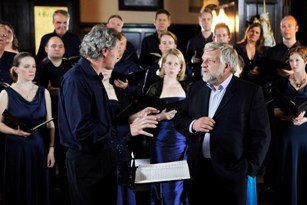 The second series of Sacred Music, also featuring The Sixteen, brings the choral story up to the present day. The first film compares the German Requiem of Brahms with the masses of Bruckner. In the second, Russell Beale returns to France to explore the religious compositions of Fauré and Poulenc. For the third, which examines the role of liturgical music under communism, he meets Arvo Pärt in Estonia, and in Poland visits the intensely Catholic world of Henryk Górecki, whose Symphony of Sorrowful Songs became a sudden and unlikely pop chart hit when championed by Classic FM. Finally, Russell Beale returns to Britain to interview three living composers: James MacMillan, John Rutter and John Tavener.
The second series of Sacred Music, also featuring The Sixteen, brings the choral story up to the present day. The first film compares the German Requiem of Brahms with the masses of Bruckner. In the second, Russell Beale returns to France to explore the religious compositions of Fauré and Poulenc. For the third, which examines the role of liturgical music under communism, he meets Arvo Pärt in Estonia, and in Poland visits the intensely Catholic world of Henryk Górecki, whose Symphony of Sorrowful Songs became a sudden and unlikely pop chart hit when championed by Classic FM. Finally, Russell Beale returns to Britain to interview three living composers: James MacMillan, John Rutter and John Tavener.
The interview took place in the National Theatre, where Russell Beale is performing opposite Fiona Shaw in Dion Boucicault's 19th-century romp, London Assurance. Through the window he could look down the river to the dome of St Paul’s Cathedral, where from seven to 13 he was a chorister. He talks to theartsdesk about the making of Sacred Music and reflects on his own decision to veer away from music and into theatre.
JASPER REES: To begin at the beginning, how did your involvement in Sacred Music come about?
SIMON RUSSELL BEALE: My agent got a phone call. I don’t know whose idea it was but I presume they must have known I was a choral scholar. They said, would I present it? And that was it. I didn’t really have any choice over the composers in the first series. In the second series we did have a meeting where we talked about options. Whether there’ll be a third series I don’t know, but if there were there are certain things we missed out. We go up to the present day so it looks as if we’ve completed the story, but of course we’ve missed out Monteverdi, we’ve missed out Gabrieli, we’ve missed out Gesualdo. And I thought the Wesleys would be fascinating - that story of Anglican church music in the 19th century which wasn’t its heyday but then ended up with marvellous things in the Edwardian period by Elgar and Parry and all that, and even late Stanford. That’s all missed out.
Did you sense you were listened to in the meeting?
I think I was, but I was only saying things that they were perfectly well aware of, like, “This is unaccompanied music you’re talking about, so you’re going to miss out the whole of the late 18th, early 19th century, the great Viennese composers, because they all had an orchestra." We were allowed an orchestra for Fauré’s Requiem.
And, instead of a full orchestra, four hands on a piano for the German Requiem.
Which actually was Brahms’s arrangement.
You chose the German Requiem as one of your Desert Island Discs.
I can’t get over Brahms. I think Brahms is just astonishing. And some of the soundtrack on the Brahms programme, the D minor piano concerto which they use as part of the soundtrack although it’s got nothing to do with sacred music at all, just makes me weep. And that has an emotional impact that I think is probably the most intense of all the composers we look at, even the French ones, which I love. Bruckner is a mystery still, actually.
Can you explain why?
Erm, oh God, why is it? These three great masses - I like the second one, the E minor one, which is actually with an incomplete orchestra. In the programme we used brass instruments for that. He doesn’t feel released in the way that Brahms does. His sense of history and his sense of writing within the Catholic tradition are so intense and so important to him that I always feel he’s slightly hemmed in by the requirement to be accurate. We know that he did this extraordinarily intense training with Simon Sechter of harmony and counterpoint, and he was obsessive about correct voice leading and correct technique. And I get the slight feeling with the pieces that he is composing to another agenda. Whereas Brahms is much more released musically, I think.
Would this disparity have anything to do with the fact that, as you say at the start of the first programme, one of them composed sacred music as an affirmation of personal faith and the other disavowed belief in God?
Absolutely. I think that’s the theme of the programmes, actually, in the end. All of them. It became obvious that that was the underlying question. I mean, there were two underlying questions. Firstly, can a non-believer write convincing religious music? And the second one is, who is this music for? - which is asked in the last one directly. I think they are sort of related.
Do you reach a conclusion about who these living composers are directing their music at?
John Rutter is the most fascinating character in that last story, I think. Even a choir as sophisticated as The Sixteen, let alone choirs that are less accomplished – he is absolutely beloved by them, and they appreciate his phenomenal skills even in pieces that people regard rather snobbishly as not great music. And he has written some wonderful music that’s serious. And he is the agnostic in the programme. Oddly enough, he is writing directly with a sense that this is a personal expression of the praise of God for those choirs who are singing it. He has an absolute understanding of that. James [MacMillan] does the same thing, perhaps even more directly, because he writes for his own choir like Bach did. Tavener is slightly more remote and I think Tavener would see that he’s writing for God rather than the choir.
Picture left: Simon Russell Beale plays the temple bowl at the Greek Orthodox cathedral of Saint Sophia (photo Mark Allan)
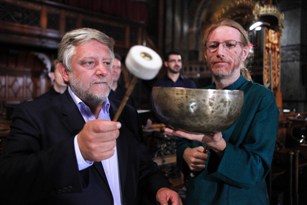 There is a lovely phrase of MacMillan’s in the final film: “Singing prayers is the best way of praying.”
There is a lovely phrase of MacMillan’s in the final film: “Singing prayers is the best way of praying.”
“He who sings prays twice.” Is that Augustine? I think it is. Tavener’s writing within the Orthodox tradition where music has a slightly different function: it’s a portal to heaven and the ikon is a method of meditating on the godhead. Whereas John’s writing and perhaps James’s even is about our yearning for God rather than an expression of God. I’m treading on dangerous ground here because I’m theologically not acute. Also of course I’m not a believer, which I say in the last programme, which I thought was very important to say. There does come a moment where you end up talking about God and you think, it sounds as if I believe it as well.
So the state of your faith is officially what?
Agnostic, still. Can’t do it.
‘Twas ever thus?
‘Twas ever thus. And I can’t do the big leap. I cry at Songs of Praise on Sunday afternoon. In fact the only time I have time to watch television is on Sunday evenings and so I have this indulgent safe two hours of Antiques Roadshow, Songs of Praise and Lark Rise to Candleford or something and go to bed in a haze of comfort. No, it still has an enormous emotional power.
Did you for a while as a boy, singing in that church you can see through the window, at least try to believe?
I remember in Confirmation I tried. There is a yearning though. If only something would happen. I don’t mean something ghastly. If only something would happen to my brain. I’d be perfectly happy to be a believer, if it could just click.
Have you discovered in the making of these programmes that the state of the composer’s faith makes no difference to the heavenliness of the music?
I suppose it’s quite a simple answer to that question. These are in many cases geniuses that can do it and make us see God. Brahms is an interesting one because I think he did believe in a transcendent something, even if it was only a transcendent humanity or human beings’ ability and potential. And the Requiem is a passionate exploration of human need in times of grief. It would be too simplistic just to write him off as an atheist. Bruckner is a steady stream whereas Brahms is more fluid in his emotional impact. Like with Beethoven, there are moments where you go, how did he think of that? How did he get that? And that’s when heaven opens. And he must have been aware of that. That’s when the human spirit wants to fly, and that’s a religious impulse, isn’t it?
To what extent did Fauré’s experience of the Franco-Prussian War have an impact on his music?
Apparently it was a pretty terrible experience. In our construction of Fauré as a figure that’s not often mentioned, because he is seen a society figure. He’s seen as dapper, as a ladies’ man. And he writes this incredibly elegant tangential music, it’s all shrugs and sighs, and the Requiem itself is so delicately placed as a piece of emotional manipulation. I was always brought up to believe that the Requiem was for the death of his father. It’s about small-town France, I think. I know it’s Parisian through and through but it always sums up for me the world of Madame Bovary, small French towns and understated grief. We forget the impact that war had, but it must have been enormous.
And in the second film you talked to the broadcaster Michael Berkeley who thanks to his father had known Poulenc.
Obviously Lennox Berkeley knew him very well and Michael was obviously terribly fond of him. That’s the other big question about all of these great composers: what they were like to you and me, as opposed to what they wrote. And Poulenc was obviously a really fun guy.
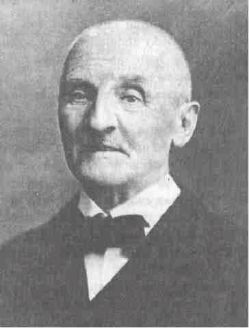 There is a moment in the first programme where you extract a supposition about the personality of Brahms from looking at his portrait. Is it possible to look into the eyes of a composer and find there an explanation for his work?
There is a moment in the first programme where you extract a supposition about the personality of Brahms from looking at his portrait. Is it possible to look into the eyes of a composer and find there an explanation for his work?
I think Bruckner is the fascinating one. Part of the reason we showed the Brahms portrait is he was such a beautiful young man. And that’s again something one tends to forget. When he arrived at the Schumann’s house he must have looked like an angel. And there was sentimental old Schumann and tough old Clara sitting there and they were bowled over by this glorious angel who could also write this fantastic music. I mention the set of his mouth only because I had to play Schubert once in a film and it’s quite difficult playing a genius because you think, well does he know? Did Brahms know that he was a great composer? I think he must have done actually. Whereas I don't think Bruckner did. I think Bruckner’s portrait is much more disturbing (pictured right), because he’s got these rather fierce eyes and a beaky nose and is terribly insecure.
You weren’t able to meet Górecki.
No, he was ill.
However, as part of his story you interview Paul Gambaccini. I somehow never expected to see you two in the same room.
No. We’re like that [he crosses his fingers]. That was completely new to me, that story of the Symphony of Sorrowful Songs. It’s an astonishing story, a completely random piece of radio marketing basically.
Can you see what it is in that music that Classic FM were able to excite in their listeners?
What I found odd was the idea of “relax” - relax and listen to a piece based on a poem scribbled on a Nazi wall. That’s what I found slightly odd. I’d never really listened to it. I had heard it like we all had during that period. And actually I have to confess that I was a little bit snobbish about it. I’ve had some wonderful experiences with minimalist music. Nixon in China, for instance, which was a fantastic evening in the opera house. I’ve always been slightly confused about minimalism. But having listened to all those pieces properly, and read analyses of them and all the rest of it, actually listening to them again was a completely different experience. It isn’t about “relax”. It’s a very taut piece.
Picture left: Simon Russell Beale and Arvo Pärt in Tallinn (photo Simon Broughton)
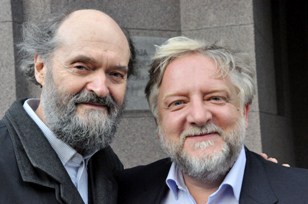 You did meet Arvo Pärt.
You did meet Arvo Pärt.
It was a bit scary because I’m not a journalist and the thing I’ve loved most about these programmes is interviewing people. I didn't realise I really loved interviewing people. But you have to adopt a persona before you do that of confidence. I’m not an expert. I say to all these interviewees, “I know nothing.” I remember interviewing the Fauré expert who had lived for 20 years with Fauré’s music and just apologising, saying, “Look, this is not going to be an academic interview and it’s not to be a newspaper interview either because I’m not particularly interested in digging dirt or anything.” But Arvo Pärt - everyone had said he’s just impossible to get hold of and Simon Broughton who was filming that programme organised a lunch, just to meet him, which took place in Tallinn. It sounds sentimental but his eyes twinkled. This gorgeous man strode forward and said, “Ah, the great Simon,” which is of course incredibly flattering and he put me at ease. And from then on he and his wife Nora were just enchanting. I can’t tell you, they were just lovely. And also stupid things, like he got a parking ticket outside the restaurant. So we had this lovely lunch and then Simon said, “Would you mind coming to the Estonian radio studios just to hear this old interview you did?”
An old interview which under the Soviet regime had not been broadcast?
It was broadcast but the big question was cut. “Who was your greatest influence?” “Christ.” It was very moving watching it because it’s moving watching anybody listening to themselves 20 years ago. We just asked if the cameras could roll and I found it a really really really intensely moving afternoon. There was an extraordinary moment when he talks about leaving [the Soviet Union in 1974] after he wrote Credo. He uses a strange image like “entering a tunnel and then emerging naked”. So we just sat and chatted and then at the end he gave me a great big hug and wanted a photograph. And I thought, you’re a sweetheart.
You do a bit of participation. You play on Fauré’s organ in Saint-Sulpice in Paris.
Picture right: Simon Russell Beale at the organ of Eglise Saint-Sulpice in Paris with organist Daniel Roth (photo Luke Finn)
 Yay! What’s wonderful is that it’s always late at night after the church has finished its duties for the day. I played some Bruckner on Bruckner’s organ in Linz. And then this extraordinary organ in Saint-Sulpice, with its amphitheatre-type layout which is oddly secular, you feel.
Yay! What’s wonderful is that it’s always late at night after the church has finished its duties for the day. I played some Bruckner on Bruckner’s organ in Linz. And then this extraordinary organ in Saint-Sulpice, with its amphitheatre-type layout which is oddly secular, you feel.
How good an organist were you?
I’m not an organist at all! I didn't do the pedals. I was playing a piano piece that I happened to have in my head. As you see in the clips, I haven’t completed a piece for years. There’s always some point in the middle where I go, “Oh fuck it, I can’t continue this.” In that particular instance I was playing a Bach fugue from The Well-Tempered Klavier. I get about eight bars in and go, “I can’t go on, it’s too complicated.”
When did you start the piano?
Five or six.
And when did you stop?
Seventeen. When school stopped I stopped having lessons. In fact I am in contact with a piano teacher but I’m doing a course in harmony and counterpoint, so that’s my obsession that is entirely as a result of the programme. I have a teacher called Robert Saxton who is a professor at Oxford. He takes me once a month and puts me through my paces.
What do those paces actually involve?
Lots of exercises in counterpoint and harmony. And we’re analysing the Goldberg Variations and some Haydn quartets.
Other than pure pleasure, is there a public goal?
Bless him, Robert said, “After a year ago you should compose something for a choir and see what happens.”
When you joined in with The Sixteen for the Fauré, it was a surprise to see you join the basses.
I can’t sing tenor any more. Actually to be honest that was a bit of a cheat because it’s a passage where the tenors and basses sing the same line anyway. I could say I was a tenor, but I can’t.
But when you were singing more seriously...
I wasn’t an easy tenor. I was a second tenor and I hated the upper range. This is part of the reason I never felt comfortable. I always said I was a baritone.
Could it be said that there is such a thing in theatre, as there is in opera, as a set of tenor roles and bass roles?
A Fach. Isn’t that what the Germans call it? Terribly pretentious word that people in England use. Your Fach – you are the soubrette, you are the lyric soprano, you are the Heldentenor, and you stick with that and it’s all you do. Singing out of your Fach is not often done. I’ve been extremely lucky in that I’ve been pretty Fach-less for most of my career, thank God.
Have you sometimes felt that you’re acting out of your Fach?
Yes, of course, and I’m sure lots of critics would think there have been many occasions out of my Fach. Hamlet was not out of my Fach but it was a borderline Fach moment.
I thought it was entirely within your Fach – a tenor role which vocally felt very right for you.
Well, actually psychologically it probably was within my Fach. Physically, probably not. I’m very pleased we don't have that restriction. I think it would be rather dull to be an opera singer, to be honest.
Picture left: Simon Russell Beale with John Rutter at St Bartholemew the Great (photo Luke Finn)
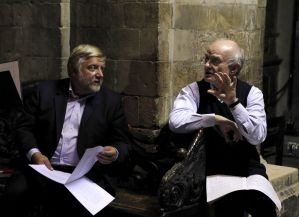 Which leads to the question... In the final programme, John Rutter describes writing for a choir as returning to his earliest roots. Does that phrase of his ring just as true for you? He describes the idea of watching a choir as being welcomed into a family. You of course come from a very musical family.
Which leads to the question... In the final programme, John Rutter describes writing for a choir as returning to his earliest roots. Does that phrase of his ring just as true for you? He describes the idea of watching a choir as being welcomed into a family. You of course come from a very musical family.
I think my attitude is a little bit more wary. I mean I don’t miss the singing at all, you see. And I don't miss that world at all. So when I watch The Sixteen they’re breathtaking in their technical skills and I keep on thinking, Gosh, I used to sing in choirs nearly as good as that like the Cambridge Chamber Choir, or whatever. But because I don't have any desire to be part of that world, I don't feel like John. I used to have a love-hate relationship with the whole singing thing. I never really felt relaxed doing it. My father was so extraordinarily skilled – it’s his life-blood, all that. Still is at 75. And it wasn’t mine, actually.
What I would say about John’s remark is I share his passion for its importance. He is passionately concerned about where the next generation of great musicians is coming from - and they are great musicians, The Sixteen – and the cathedral scholar culture and the organ scholar culture. I don't share his returning to the family thing. It’s more like we’re distant cousins.
For several years you were a chorister in that building you can see through the window.
It’s funny, I don’t long for it. I look at it and I think, God, a lovely building, and somehow it’s not really anything to do with me.
Has it anything to do with you as an actor? Did it somehow feed into your career?
I have absolutely no doubt that the discipline that they require of extremely young children is something that you never, ever, ever forget. I don’t think you can treat children for on an average two hours a day as professionals without having that effect on your professional life. When you watch an adult choir and occasionally you see people who hold up their hands, they are choir-school trained. It’s when they make a mistake. It means you know that you’ve made a mistake, you won’t do it again, the director of music or conductor can see that you know you’ve made a mistake which means that you won't need to go back over it. Now, eight-year-olds were doing that. The idea at the age of eight onwards that you can take responsibility for your own mistake – I think that induces some sort of professional attitude.
How good a singer were you when your voice broke?
Not.
Were you better as a treble?
No, I was a worse singer as a treble. I wasn’t a good treble. I was never given a solo, ever.
But you were good enough to be in that choir.
Yeah, but I think at seven almost any child can potentially sing.
I’m not sure that’s right.
There was a documentary made about the choir school about 10 years after I left and Barry Rose was head of music at that time and he said, “What I look for is very bright-eyed children. I look for bright faces.” Famously I was never ever given a solo. Ever. That’s quite something in six years. I think my relationship with the director of music there wasn’t the easiest. I loved the headmaster. I thought he was a wonderful man, and he had faith in me. I don’t think the director of music at the time had a lot of faith in me, to be honest. I was steady enough. I was made head boy and head chorister and all of that. But I was never a soloist. And I think that sort of affected my future musical performing level, including the piano.
And ultimately impacted on your decision not to sing professionally?
I never felt confident. I always at school felt confident on stage as an actor. My adult voice was quite pretty, quite elegant. It was tiny. God knows, I could have trained myself to become a bigger singer. I had a wonderful singing teacher at the Guildhall, a big Russian-type bass baritone. He gave me very strict talkings-to and said, "You are going to have to build it up again."
By that time you had already committed to training as an actor.
Well, in my head I had, yeah. But I hadn’t made the jump.
Had you made that decision quite a long time before?
Probably. But after university there is that funny period where I got a place to do a PhD and applied to merchant banks because that's what you did in the early Eighties. I didn’t know what I was going to do. And then did this funny thing of swapping over at the Guildhall, and phoning Dad up and going, “I want to be an actor,” and him going, “Thank God for that.”
So you swapped over after how long?
About six months. I can’t really remember but it was within the first year. And it was regarded as not done, really. I wouldn’t do it now. It’s amazing what you do when you’re young. I’d be more aware that this is simply not on, really. I wrote to the drama department and said, “Would you audition me?” And they wrote back and said, “Not really the way to do things but yeah, we’ll see you.”
How much of a relief did it feel to switch?
Actually it was huge.
Why?
Because I was doing something that I didn't feel anxious about. Singing is very anxious-making, it really is. Even in the very first series, the Byrd programme, I remember we were in a house in Essex where the family that Byrd worked for lived, and for a bit of fun some of the guys said, “Let’s sing a five-part. Go on, Simon, you sing the baritone line.” Which was fine for sight-reading. But I could feel the anxiety level rising. And listening to them doing the three-part mass and the alto entering first, I interviewed them afterwards and said, “Does it terrify you to have to sing the first note that’s heard.” How does the brain work to know what the first note is? When you’re singing a huge operatic role or something as tiny as the first entrance of the alto in the "Agnus Dei" of a Byrd three-part mass, that type of control is beyond me. Whereas “To be or not to be” I can actually say without worrying about “To”.
- Sacred Music begins on BBC Four on Friday 12 March at 7.30.
- Find The Sixteen on Amazon
- London Assurance by Dion Boucicault is in rep at the National Theatre. Book online.
Watch a clip from the Sacred Music episode on Bach:

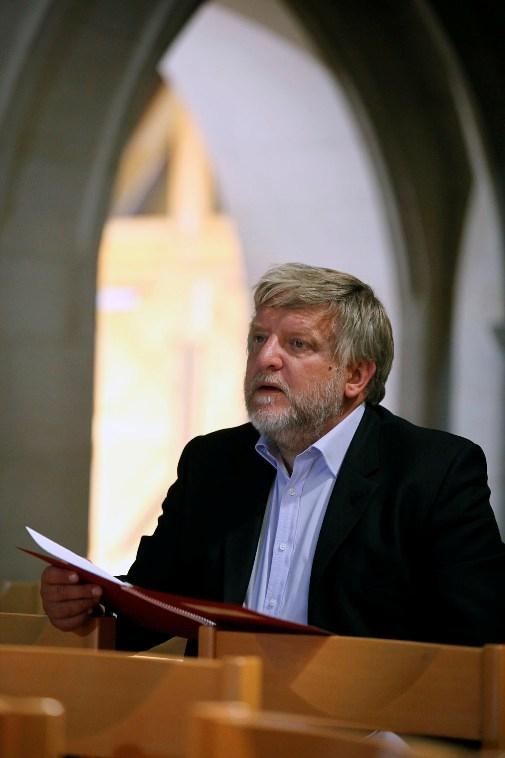













Add comment